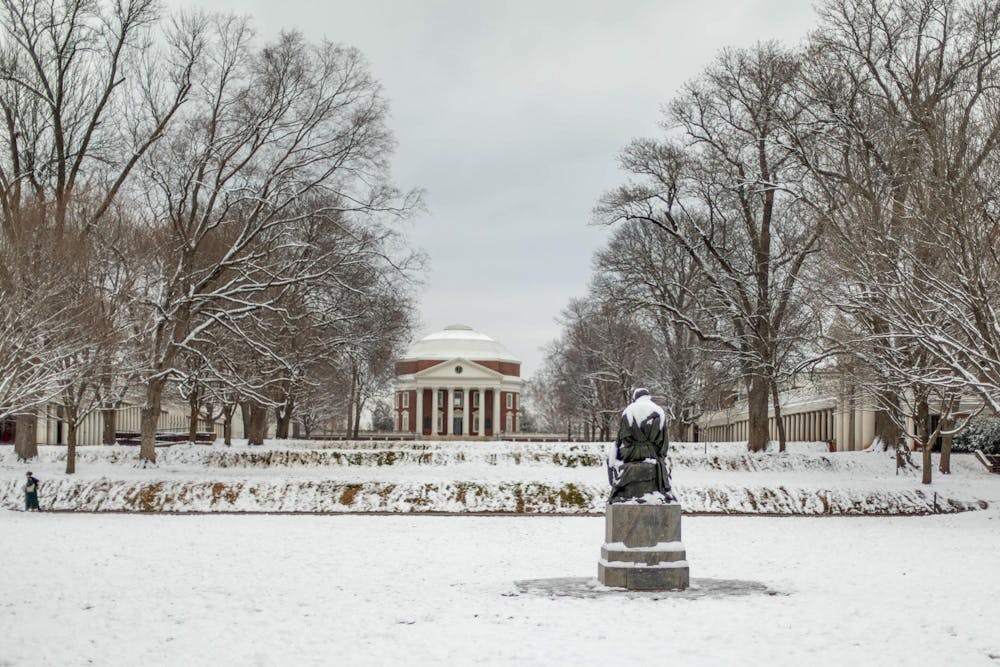Initiated in 2013, the University’s 2030 plan lays out the goal to become the best public university in the country. The 2030 website proudly announces a variety of accomplishments and initiatives including the University’s top ranking in free speech, a purported investment in faculty and an allegedly sustainable expansion into the Charlottesville community. Rather than reflecting the reality, the University’s description of the 2030 plan obfuscates stakeholders’ experiences and neglects what is actually a concerted commercialization of education. The 135th and 136th Editorial Boards of The Cavalier Daily believe that the University administration’s relentless push to commercialize this space risks sacrificing the institution’s educational mission in favor of a profit-driven conception of higher education.
Since the University was founded in 1819, the implementation of its mission has evolved over the years. Yet, some of the philosophy which underpinned the founding remains relevant, specifically the idea that this University is and ought to be different. For example, at the center of Grounds is the Rotunda, a library, which reflects Thomas Jefferson’s radical vision which differed dramatically from most universities of the time which were centered around a church. By doing something which was so categorically different, Jefferson laid the groundwork for an innovative educational mission. However, the commercialization with which we are concerned is fundamentally at odds with this creative mission. After all, measuring the University’s worth in terms of accrued capital, operational efficiency and numerical rankings molds this space into just another cookie-cutter institution. But what does commercialization look like in practice?
For students, commercialization has directly impacted their ability to critically engage with the University. Specifically, by implicitly foregrounding efficiency in education, the University has curtailed student voice and negatively impacted the daily student experience. For example, the University Guide Service, which acts as an outward representation of the student experience, was suspended by the University with minimal explanation. Instead of prioritizing grassroots stakeholder voices, the University has empowered Office of Admissions interns, a policy which ensures greater narrative control. Undoubtedly, this is more efficient for the University — controlling admissions tours allows the University to maximize commercial gain by minimizing controversy. In this way, the University seeks to protect their corporate reputation on the national stage instead of supporting the self-governance of students within our community.
For faculty, commercialization of the University has forced them to compromise educational pedagogy. This is particularly concerning because teaching is the backbone of any educational institution. The negative effects of commercialized teaching is most apparent in the letter sent by 128 faculty members of the School of Medicine. These faculty demanded the removal of two major U.Va Health leaders and emphasized that their leadership had contributed to a teaching culture which prioritized financial benefit over the wellbeing of patients. This pedagogical disempowerment is not confined to the medical school — the Batten Curve also formalizes a system which prioritizes prestige and nominal rigor over pedagogically sound teaching techniques. By disempowering the faculty community, the University has disempowered the agents of students’ education and permitted the corruption of pedagogy.
For the Charlottesville community at large, commercialization has placed University expansion above their voices which seem to have been deemed inconvenient for the University’s public reputation. In other words, the University is participating in a national, neverending competition that can come at the expense of an oft-forgotten stakeholder — locals. Local residents must be part of the calculus when determining whether expansion is truly beneficial. However, the historical displacement of marginalized communities, in tandem with land banking which the University expands yearly, demonstrates that the University will likely continue to prioritize rankings over community interests.
That said, prestige and profit do not necessarily have to be at odds with community interests or the mission of education writ large. In fact, commercial goals can be creatively aligned with the needs of stakeholders in the University community — something which the University itself has proven in the post-affirmative action landscape. The University weathered a post-affirmative action application cycle by undertaking unique initiatives which fostered racial and socioeconomic diversity of the Class of 2029, diversity which far exceeded that of its competitors. In this way, the University both distinguished itself as a national leader for diversity, and also furthered its educational commitment to financial accessibility. When the University foregrounds innovative approaches to education instead of commercial goals — just as Jefferson proposed — excellence and prestige will inevitably follow.
For years now, the University has been operating like a business, silencing stakeholders to play the same market that universities around the country have made their standard. Careful commercialization can reinforce the University’s mission by innovatively subsidizing community goals. But reckless commercialization can also destroy it. For that reason, the University must ascertain ways to merge commercial and stakeholder interests. But it can never lose sight of its most fundamental mission — education.
This has been a joint editorial from the 134th and 135th Editorial Boards. The Cavalier Daily Editorial Board is composed of the Executive Editor, the Editor-in-Chief, the two Opinion Editors, their Senior Associates and an Opinion Columnist. The board can be reached at eb@cavalierdaily.com.







